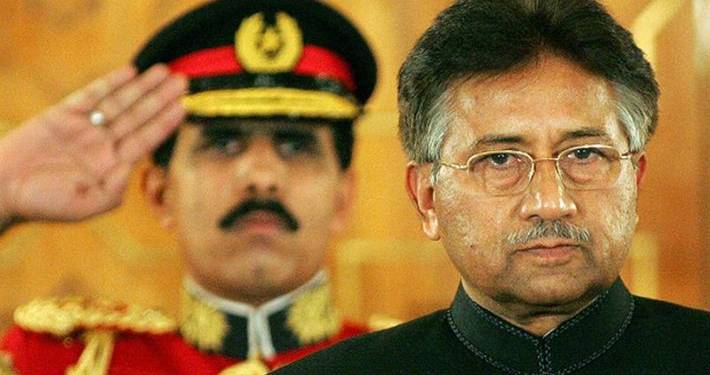Pakistan’s former dictator Pervez Musharraf was sentenced to death for high treason, throwing the country into yet another crisis as the Pakistan Military is against the verdict. Musharraf overthrew Sharif’s civilian government and assumed the reigns of Pakistan which he ruled with an iron fist till 2008. His tenure was marked with cases of extreme barbarity and it is only fitting that Musharraf is being sentenced to death for his crimes.
Musharraf was sentenced to death in absentia for high treason as a three-member special court in Islamabad on Tuesday convicted Musharraf of violating the constitution by unlawfully declaring emergency rule while he was in power, in a case that had been pending since 2013. Musharraf is currently in a self-imposed exile in Dubai and is unlikely to return to Pakistan ever but the former dictator has an option to appeal the verdict. Musharraf who seized power in a military coup in 1999 and ruled Pakistan as President until 2008 was indicted in 2014 on a total of five charges, including three counts of subverting, suspending and changing the country’s constitution, firing Pakistan’s chief justice, and imposing emergency rule. It’s the first time in Pakistan’s history that an army chief has been tried and found guilty of treason. Under Pakistan’s constitution, high treason is a crime that carries the death penalty or life imprisonment.
It seems that occupying the top spot in Pakistan comes with its own consequences as there’s a history of Pakistani Prime Ministers assassinated or hanged as was the case with Benazir Bhutto and Zulfiqar Ali Bhutto. Musharraf played a key role in the assassination of Benazir Bhutto upon the latter’s return to Pakistan. Benazir was seeking a third term as the Prime Minister when she was assassinated by a 15-year-old suicide bomber in Rawalpindi after her rally. Under pressure, Musharraf the then Pakistan President was forced to call for elections in January 2008 which saw the charismatic Benazir return to Pakistan and challenge Musharraf’s reign. Prosecutors say that Musharraf phoned Benazir Bhutto in Washington three weeks before she ended eight years in self-imposed exile. Long-serving Bhutto aide Mark Seighal and journalist Ron Suskind both say they were with Bhutto when the call came in. According to Seighal, immediately after the call, Bhutto said: “He threatened me. He told me not to come back. He warned me not to come back. Musharraf said he would not be responsible for what would happen to Bhutto if she returned, Seighal told the BBC. “And he said that her safety, her security was a function of her relationship with him.” Musharraf has himself been charged with murder, criminal conspiracy for murder and facilitation for murder concerning the Bhutto case but the case has been stalled as Musharraf is currently in Dubai since 2016. Benazir’s father Zulfiqar Ali Bhutto also met a similar fate as he was convicted for murder and hanged to death in a highly controversial trial by General Zia Ul Haq.
Musharraf was also the chief orchestrator of the Kargil War. While Vajpayee and Sharif were taking steps to ensure peace between the two neighbouring countries, Musharraf undid whatever little that was achieved with the Kargil War. The Kargil war was Musharraf’s brainchild who was determined to take back Siachen from India. In 1984, in response to the Pakistan Army’s intrusions into Kargil, India launched ‘Operation Meghdoot’, taking control of Siachen and its tributary glaciers. In response to this, then Pakistan’s Army Chief General Pervez Musharraf, who had headed the failed ‘Siachen operations’, vowed to occupy Kargil. The Kargil War of 1999 was brought about as a result of the personal ambition of General Musharraf.
Balochistan has been ignored by Pakistan ever since it gained independence as the latter continues to plunder the region for its natural resources. The Baloch have been up in arms against Pakistan but it was Musharraf who fanned the fire as it is widely believed that Musharraf was involved in the killing of Baloch nationalist Nawab Akbar Shahbaz Khan Bugti. Musharraf was acquitted by an anti-terrorism court in 2016 over the charges of the alleged murder of Bugti.
Pakistan is yet again staring at another crisis as its judiciary is taking the military head-on. Last month, it curtailed Bajwa’s extension granted by Imran Khan and now the decision to hang Musharraf has set tongues wagging in the military. The media wing of the Pakistan Armed Forces said the special court’s sentence had been received “with a lot of pain and anguish”. Pakistan’s Inter-Services Public Relations (ISPR) said that Musharraf “can surely never be a traitor” and that he had served the country for over 40 years. “The due legal process seems to have been ignored including (the) constitution of the special court, (the) denial of the fundamental right of self-defence, undertaking individual-specific proceedings and concluding the case in haste,” the statement said. It added that the Armed Forces of Pakistan “expect that justice will be dispensed in line with the Constitution of the Islamic Republic.”
It remains to be seen whether the Military would allow one of its own to be hanged to death.

























